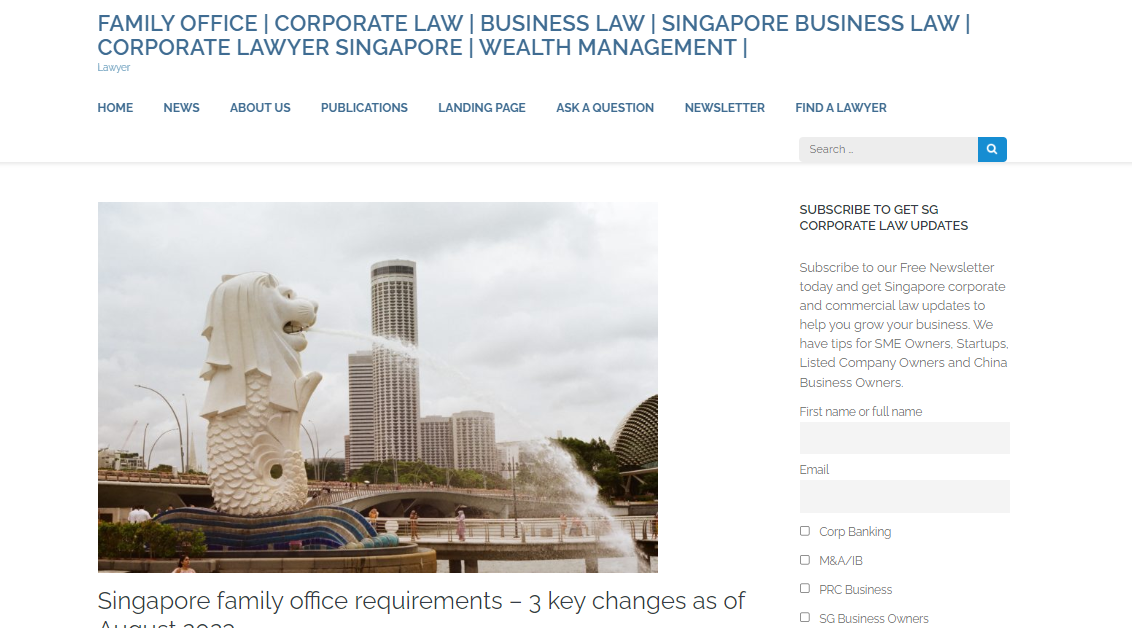
Explore the transformative landscape of Singapore Family Office Requirements in 2023 with insights into crucial amendments under S13O and S13U of the Income Tax Act 1947. Learn how these changes impact minimum assets under management and discover the dynamic tax incentives for Single Family Offices.
In the bustling financial landscape of Singapore, the concept of family offices has gained significant traction, attracting an influx of offshore funds from families seeking to establish a robust financial hub. This article delves into the intricacies of family office Singapore requirements, shedding light on three pivotal changes set to shape the landscape in 2023.
#1 Change in Minimum Assets Under Management (AUM) - Decoding S13O and S13U of the Income Tax Act 1947
At the heart of the alterations lies a fundamental shift in the minimum assets under management criteria for Single Family Offices. The Exempt Fund Manager, responsible for overseeing funds held by a Singapore entity (the Fund), plays a central role in navigating the tax incentives under S13O and S13U of the Income Tax Act 1947.
Traditionally, discussions around tax incentives for Single Family Offices focused on the Fund. However, the nuanced amendments under S13O and S13U now distinguish between the targeted AUM requirements. S13O caters to smaller AUM, with the bar set at S$20 million, while S13U is geared towards entities managing S$50 million and above AUM.
This change not only streamlines the application process but also enhances clarity for family offices, aligning tax incentives with the scale of assets under their purview. As families embark on the journey of establishing and managing family offices in Singapore, understanding these targeted asset under management requirements becomes paramount.
To learn more about the impact of these changes, click here.
Exploring the Tax Incentive Schemes: Navigating the S13O and S13U Terrain
The tax landscape for Single Family Offices is intricately woven into two primary incentive schemes: S13O and S13U of the Income Tax Act 1947. The former, designed for entities with smaller AUM, offers a tax-friendly environment for family offices managing funds up to S$20 million.
In contrast, S13U caters to the substantial players, requiring a minimum AUM of S$50 million. This dichotomy ensures that family offices of varying scales can avail themselves of tailored tax incentives, fostering a diverse ecosystem within Singapore's financial sector.
Visit us to explore the nuances of tax incentives for Single Family Offices under S13O and S13U.
Impact on Offshore Funds: A Closer Look at Singapore Family Office Requirements
As Singapore emerges as a favored destination for family offices, the impact of these regulatory changes reverberates across offshore funds. Families navigating the complexities of offshore fund management can now leverage the clarity provided by the amended S13O and S13U criteria, aligning their financial strategies with the evolving Singaporean landscape.
Explore more about the implications of Singapore Family Office Requirements on offshore fund management.
In conclusion, the 2023 landscape of Singapore Family Office Requirements unfolds with transformative changes, emphasizing clarity, scalability, and tailored tax incentives. As families chart their course in the dynamic financial waters of Singapore, staying abreast of these changes becomes not just a compliance necessity but a strategic imperative.

0 Comments